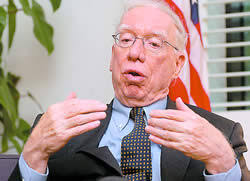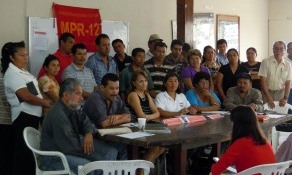International Meddling, Politics
US Immigration Reform and the 2009 Salvadoran Elections
By Annie Levenson-Falk
October 7th, 2008
In recent years, immigration has been a major issue in U.S. politics, and an area in which we may see major change in coming years. In the past, U.S. representatives have threatened that immigration policy could be changed because of the results of Salvadoran elections. Policy decisions like this, however, are made based mainly on internal factors, and it’s quite unlikely that immigration law would be changed based on the results of next year’s presidential election.
Both U.S. presidential candidates – Republican John McCain and Democrat Barack Obama – said that, if elected, they would try to bring about comprehensive immigration reform, though what exactly “comprehensive immigration reform” means was different for the two candidates. Obama’s position put more emphasis on keeping families together and providing a path to legalization for the millions of undocumented immigrants in the United States.
The president is in charge of enforcing the laws of the United States. The president decides whether or not to pursue immigrants who are in the country without proper documentation, for example. However, decisions that would require law changes – like whether or not to give immigrants in the U.S. without documentation the opportunity to become legal residents, or whether or not to extend Temporary Protected Status (TPS) for Salvadorans here on TPS visas – are out of the president’s control. They must be made by a majority of the members Congress, which means these changes much more difficult to achieve.
In 2004, some U.S. officials insinuated that immigration policy, and even remittances, could be radically changed based on the result of that year’s presidential election. These threats were carried by the Salvadoran press and reinforced by ARENA party campaign advertisements, causing fear that, if the FMLN were to be elected, the U.S. would put a stop to the remittances that currently provide El Salvador with more than $3.5 billion each year.
As U.S. Ambassador Douglas Barclay himself said, this is not true. First of all, remittances go through private banks, which are not controlled by the U.S. Government. Second, Congress and the president must consider many factors when making policy decisions, and they are lobbied by many strong interests. In the case of immigration policy, this includes unions, big businesses, and dozens of think tanks and nonprofit organizations. Foreign pressures form a part of the picture, but they are only one small factor among many. “The U.S. Government has nothing to do with remittances,” Ambassador Barclay said. “Regarding the migration situation . . . it would be speculation that a law would be changed because of the results of an election.”
As recent U.S. experience has shown, reforming immigration policy is very difficult – several attempts have been made at major reforms in recent years, and none has been successful. Some U.S. officials have already begun to hint that an FMLN victory in 2009 would hurt the status of Salvadoran in the United States. However, regardless of which presidential candidates is elected in the U.S. and which in El Salvador, it is very unlikely that these policy decisions will be influenced much by the results of the 2009 Salvadoran election.



